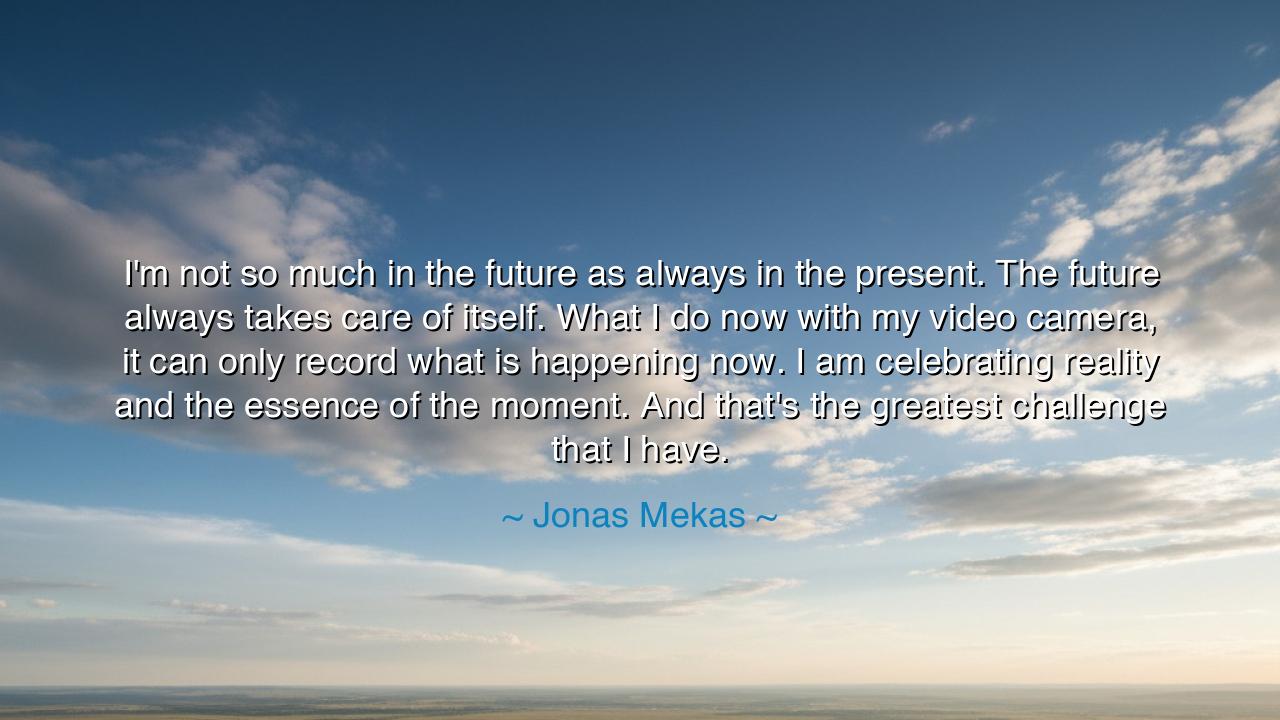
I'm not so much in the future as always in the present. The
I'm not so much in the future as always in the present. The future always takes care of itself. What I do now with my video camera, it can only record what is happening now. I am celebrating reality and the essence of the moment. And that's the greatest challenge that I have.






"I'm not so much in the future as always in the present. The future always takes care of itself. What I do now with my video camera, it can only record what is happening now. I am celebrating reality and the essence of the moment. And that's the greatest challenge that I have." These words, spoken by Jonas Mekas, a filmmaker and chronicler of life's fleeting moments, speak to the core of the human condition: our tendency to focus on the future at the expense of the present. Mekas, through the lens of his camera, captures not the imagined future, but the raw and beautiful reality of now. In his view, the future is not something to be worried about or controlled—it is something that unfolds naturally, beyond the reach of human grasp. His work, much like his philosophy, celebrates the present moment and the profound beauty that lies in simply being alive.
In the hustle of daily life, many of us become consumed with what lies ahead: the goals we must achieve, the problems we must solve, the plans we must execute. It is easy to become lost in the future, always striving for something just out of reach, always waiting for the next achievement, the next milestone, the next reward. But Mekas challenges us to step away from this constant forward gaze and embrace the here and now. The present moment, he suggests, is where life truly happens. The future, however uncertain or distant, will take care of itself, but the present is a fleeting gift, one that cannot be recaptured once it passes.
Think of the great philosopher Socrates, who, like Mekas, placed great value on the present. Socrates taught his followers to live with awareness, to question the world around them, and to focus on the immediate experience of life. He believed that true wisdom came not from future predictions or distant aspirations, but from the deep, present reflection on one’s actions and thoughts. Socrates himself, in his unhurried life and timeless teachings, demonstrated the power of the present moment—a philosophy that transcends time and culture, urging us to recognize the value of each passing second.
Mekas’s video camera becomes a symbol not just of technology, but of the art of capturing reality. In a world filled with distractions, where our attention is constantly pulled away to future concerns or past regrets, the act of recording the present—of focusing entirely on what is happening right now—becomes an act of reverence. The essence of life is found not in the distant horizon but in the small, unnoticed moments: the smile of a friend, the rustle of leaves in the wind, the fleeting glance of a passerby. These are the moments that Mekas cherishes, and through his work, he teaches us to slow down and celebrate reality.
Consider the artist Vincent van Gogh, whose masterpieces are now celebrated for their vibrant depiction of the world around him, yet during his lifetime, he faced ridicule and rejection. Van Gogh, in his intense focus on the present moment, painted not just the landscapes he saw, but the emotions he felt in the very act of creating. His famous work The Starry Night does not depict a distant future or a faraway land—it captures a scene from his own mind, a representation of his deep connection to the present moment. Van Gogh, like Mekas, found meaning in the immediacy of experience, and through his art, he left a timeless testament to the power of the now.
The lesson in Mekas’s quote is a profound one: do not wait for the future to find meaning or purpose. The future, ever elusive, will always remain just out of reach. The only true reality is the present, and it is in embracing the present that we find life’s truest essence. Like the greatest challenge that Mekas faces in his work—celebrating the now—each of us is called to witness the beauty of the present in our own lives. Whether through art, relationships, or simple acts of living, we must learn to focus our attention on the moments that make up the tapestry of our existence, rather than obsessing over what has yet to come.
Let us, then, live with intention and awareness, recognizing that every moment is an opportunity to experience life in its fullness. The future may indeed take care of itself, but we must be present to experience its arrival. We must engage deeply with the world around us, not waiting for the next thing but fully embracing the one in front of us. As Mekas suggests, the greatest challenge is not to control the future, but to live fully in the present—to witness it, to capture it, and to celebrate it. This is the key to true fulfillment, for in the end, it is not what we will do, but what we are doing now that defines our legacy.






AAdministratorAdministrator
Welcome, honored guests. Please leave a comment, we will respond soon